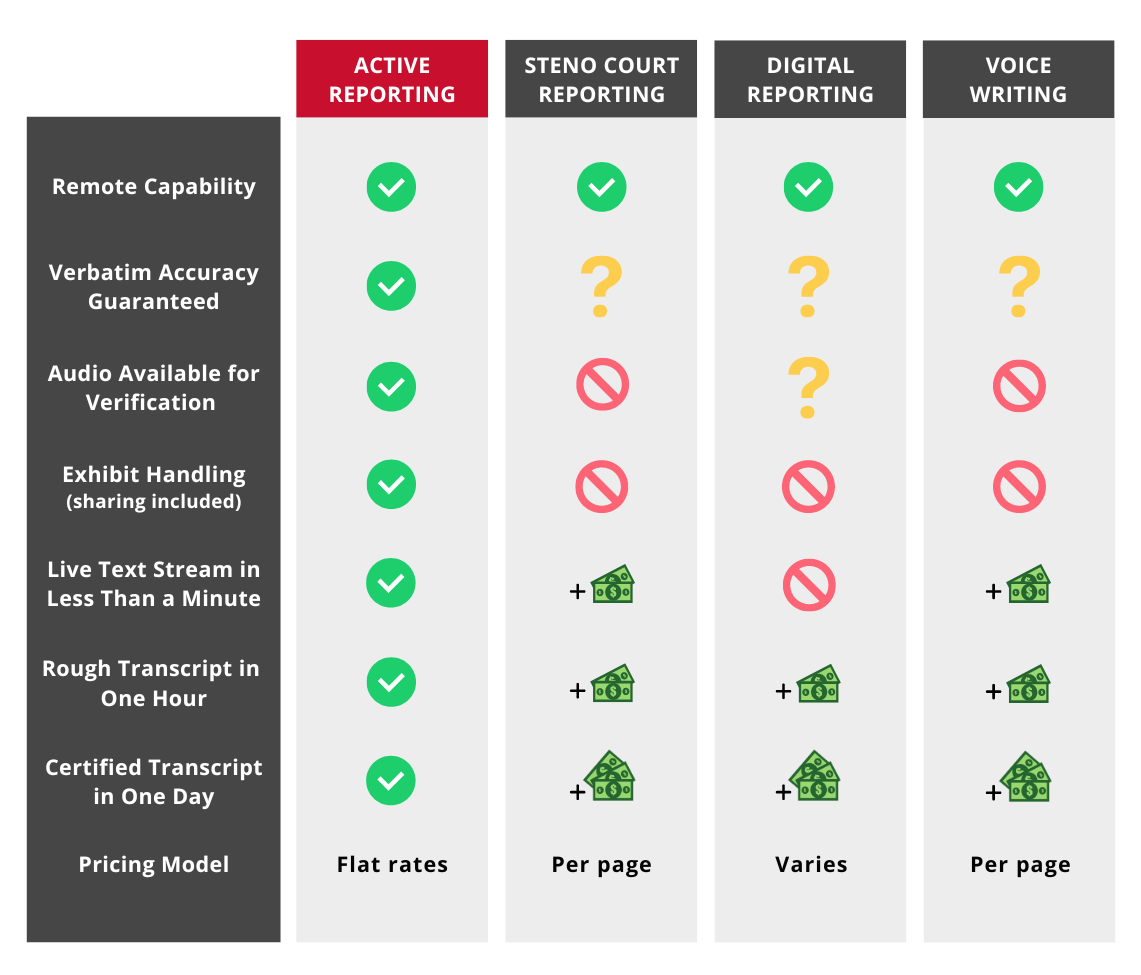It’s easy to dismiss the newest tech craze as a fad . . . until you can’t anymore. Technology can inspire equal parts wonderment and anxiety depending on how it’s presented. Take generative AI, for example. In a matter of months, this newest “fad” went from, “Wow, that’s cool,” to “Actually, this is a little scary,” prompting a host of moral and ethical questions. Add to this fears that AI will either take your job or go rogue and it’s no wonder people have a healthy skepticism, if not outright apprehension. But time marches on. And whether we like it or not, success means adapting to modern tools and preparing for the future.
A similar conversation is taking place in the field of deposition reporting. Your deposition service should be capable of adapting as well. It’s not a matter of if change will occur, but when. Fueled by a well-documented court reporter shortage, the prospect of legal tech providing a viable option to capture testimony cannot be easily dismissed. Readback is a non-stenographic deposition service that uses AI speech-to-text technology to capture the record. But what does this actually mean? In short, it means keeping what works while making your life easier.
In his 2018 Tedx Talk titled, The four-letter code to selling anything, writer and editor to The Atlantic, Derek Thompson, discussed a philosophy of famed engineer, Robert Loewy:
“Loewy said that, in order to make hits, you need to make products that live right at that intersection of the familiar surprise. To sell something familiar, you have to make it surprising. But to sell something surprising, you have to make it familiar.”
Derek Thompson calls this MAYA, the Most Advanced Yet Acceptable approach to marketing. However, when it comes to legal tech, proponents too often focus on the surprise with little appreciation for the familiar. Admittedly, for some attorneys, the words “legal tech” might spark feelings of dread. How does this even work? Is there tech support? Can I trust this new technology? All very reasonable concerns. But before you curse your next foray into the world of legal tech, consider that, sometimes, today’s “new fad” is a direct response to yesterday’s problems. Skepticism to change is nothing new. Believe it or not, even the lightbulb faced criticism as a “conspicuous failure” back in 1879.
So let’s apply MAYA to deposition reporting. In his presentation at the 2021 MaxLaw Conference, InfraWare CEO, Nick Mahurin, unveiled a new AI-driven deposition service called Readback, a tool designed to revolutionize the industry and empower attorneys frustrated by the court reporter shortage. Mahurin realized that, whereas other areas of information technology provide improved returns at lower costs, the business model behind court reporting subjects attorneys to cost increases with slower returns.
 When your industry relies on an outdated technology like the steno machine, a certified transcript can take weeks to produce. If you want to expedite the process, that’s an additional fee. And the ability to take advantage of a premium deposition service like real-time reporting is often reserved to attorneys representing clients with very deep pockets. That’s why Readback replaces the steno machine with speech-to-text technology to capture the record in near time. By doing so, Readback affords premium deposition service at low, flat rates. Instead of paying more to wait two weeks for a certified transcript, Readback offers Active Reporting, a level of deposition service that provides certified transcripts in just one day, rough drafts in only one hour, and access to near-time text in seconds.
When your industry relies on an outdated technology like the steno machine, a certified transcript can take weeks to produce. If you want to expedite the process, that’s an additional fee. And the ability to take advantage of a premium deposition service like real-time reporting is often reserved to attorneys representing clients with very deep pockets. That’s why Readback replaces the steno machine with speech-to-text technology to capture the record in near time. By doing so, Readback affords premium deposition service at low, flat rates. Instead of paying more to wait two weeks for a certified transcript, Readback offers Active Reporting, a level of deposition service that provides certified transcripts in just one day, rough drafts in only one hour, and access to near-time text in seconds.
The surprise is Readback’s patented speech-to-text technology. But what about the familiar? Well, you should know that Readback is not a startup company. Quite the opposite. Readback’s parent company, InfraWare, is a tech-enabled services company with over 100 employees nationwide. In 2017, InfraWare purchased a New England court reporting company with more than 60 years’ and 67,000 depositions’ worth of experience in court reporting. InfraWare has decades’ worth of experience using AI to process medical transcripts, and four U.S. patents. The people behind Readback relied on this wealth of experience to properly assess the court reporting industry and its shortcomings.
Finally, although Readback is proud of its use of AI to help attorneys achieve their best performance, it’s understood that more is needed to ensure an accurate and trustworthy transcript. Readback does not rely on speech-to-text alone to deliver your deposition experience. Instead, a human Guardian appears remotely to simultaneously oversee your deposition, handle exhibits, answer questions, read back testimony, and ensure the proceeding runs smoothly. Additionally, a team of human transcribers simultaneously access the live feed to edit the transcript as it is being rendered. What makes Readback so familiar is that it keeps what works. That human element remains prevalent throughout the Readback process.
So there you have it, the best of both worlds. The benefits of legal tech, but safeguarded by human direction. To put it another way, Readback mixes the familiar and the new, keeping what has worked for decades while also using legal tech to make your life easier. Want to experience it for yourself? Visit our website to join a live demonstration.
*Disclaimer: Readback is neither a law firm nor a substitution for legal advice. This post should not be taken as legal opinion or advice.



